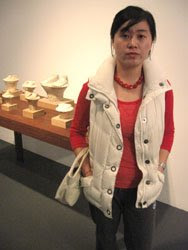 Ai Weiwei's Under Construction, at the Campbelltown Arts Centre, poses - says curator Charles Merewether - questions about artistic originality.
Ai Weiwei's Under Construction, at the Campbelltown Arts Centre, poses - says curator Charles Merewether - questions about artistic originality. Ai himself - a smooth bear of a man with overhanging eyelids, like counter-culture filmmaker extraordinaire Rainer Fassbinder - is more laconic.
About a 2000 Beijing sculpture, In Between, the 50-year-old artist said he "wanted to make something they couldn't take down easily" (p 68). My friend agrees Ai is humble.
He's come out of the wilderness, like Deng Xiaoping, into the mainland mainstream. But, she says, not many Chinese will understand his Modernist referents.
In the early 1980s, while working as a house painter in New York, Ai was "influenced ... by the spirit of Dada" (Ai Weiwei: Under Construction, UNSW Press, 2008, p 49) and "anti-art practices based on dismantling ... traditions that privileged subjectivity" (ibid). "[T]here is no particular skill on display" (p 36).
 To Merewether Ai's attitude here is "[r]edolent of the Surrealist fascination with the structure of the fetish and everyday objects" (p 37). It is "a question of nomination" opposed to the 'bourgeois' ethos of art as "distinguish[ed] from the functionality of the commonplace and commodification of everyday life" (ibid).
To Merewether Ai's attitude here is "[r]edolent of the Surrealist fascination with the structure of the fetish and everyday objects" (p 37). It is "a question of nomination" opposed to the 'bourgeois' ethos of art as "distinguish[ed] from the functionality of the commonplace and commodification of everyday life" (ibid).Early work was "modest in scope and ambition" (p 38). In 1994, Ai expanded his palette by snapping his wife, Lu Qing, in Tiananmen Square, with her skirt raised and her white underclothes visible - even to the taxi driver waiting alongside. The snapshot "suggests an irreverant association between Mao and sex" (p 52).
It also recalls the savagery of Ekwilist boys and girls intent on destroying subjective culture - and Adam Krug - in Nabokov's Bend Sinister (1947). A heady mixture of power, sex, and destruction renders a striking guise in the book.
 Ai's audience is not just Western - though his main font and spur is here. His references are not only obvious but curiously pointed.
Ai's audience is not just Western - though his main font and spur is here. His references are not only obvious but curiously pointed.Ai attains the striking image. This calligraphy-based way of thinking (Chinese is a paratactical language, and is unlike European languages, which are hypotactical) emerges from the artist in such expressions as: "just one hit you know", "very strong and precise", "this was needed for mankind's progress" (p 85).
Provisional Landscape (2002-05), for example, elicited this from my friend: "The government should regulate the appearance" of the buildings going up at such speed in big Chinese cities. Ai makes his point.
But hidden among the mainly large-scale pieces - Bed (2004) and Bench (2004, pic below), for example - is the astonishing Ruyi (2006).
While Bench is made from Qing dynasty ironwood removed from a temple destroyed to make space for apartment blocks, the ceramic Ruyi self-consciously derives from New York's pasticheur Jeff Koons. Merewether says Ai also points back to early Western patterns of luxury consumption.
 At that time, Chinese products held a high value. The critic says that Ai uses a repressive dynastic structure as a referent. It could, on the one hand, produce very beautiful objects in volume and, on the other, keep its people in thrall (p 87).
At that time, Chinese products held a high value. The critic says that Ai uses a repressive dynastic structure as a referent. It could, on the one hand, produce very beautiful objects in volume and, on the other, keep its people in thrall (p 87).A ruyi is not often found in China now. In times past, however, it would make a special gift signifying wealth in its form as a pure display object. It also signified 'good wish' since earliest times when it was the accoutrement of a special kind of Buddha. One that could bring people good wishes.
Ai's work shocked my friend "because he changed the meaning". "It's disgusting." Really? "Yes, of course it's disgusting." Why?
"I can feel the feeling but I don't know how to express it. I feel very bad. People want to hold ruyi and put it in their living rooms.
"Just imagine, during Christmas, that you hang chicken guts on a Christmas tree. What is he trying to say? It's related to the name of the exhibition. He's trying to say that China must sacrifice something to get fortune." What?
"I told you my feeling. Organs are disgusting. Ruyi is a gift from god. They show it to all their relatives and friends. It means: 'I can get good fortune in the coming year'. But now, he's put organs ... it's ..."

No comments:
Post a Comment